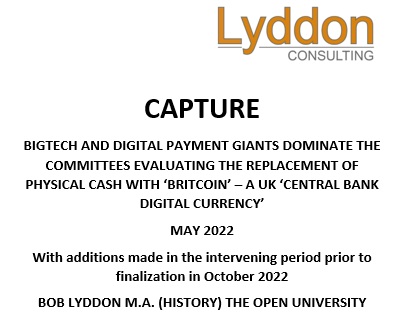Published on 21 November 2022
Sir Jon Cunliffe, Deputy Governor of Financial Stability, Bank of England, sees no contradiction between the rampant instability on Planet Cryptocurrency and the Bank’s plans to replace our cash with its own UK version of a cryptocurrency.[1] This is the message today from the most senior person responsible for the stability of the UK currency.
Welcome to the world where everything means the opposite of what it calls itself.
FTX is (or was) an exchange for buying and selling crypto assets and it also issued its own token called FFT.[2] FTX has filed for bankruptcy, its tokens have crashed in value, and the exchange itself is now nearly valueless. The losses for buyers have been estimated as high as US$8 billion.[3] Shoddy governance, poor accounting, epic value destruction, whizz kids who turn out to be incompetents: these are now recognized as the hallmarks of the crypto world – except by the Bank of England.
The Bank, at the behest of HM Treasury, is plodding onward – with its unprecious load of unmoney – down the path laid out in the most recent Queen’s Speech, the Lobby Pack for which on pp. 55-6 promised measures for ‘the safe adoption of cryptocurrencies’. This has now been carried forward into the Financial Services and Markets Bill and the Chancellor’s Autumn Statement , in para 5.69 of which on p. 57 the Government Chief Scientific Adviser and National Technology Officer (Sir Patrick Vallance) has been tasked ‘to lead work to consider how the UK can better regulate emerging technologies, enabling their rapid and safe introduction’. The target industries include digital technology and financial services, which translates into English as cryptocurrency and its supporting technology, ‘blockchain’ aka Distributed Ledger Technology.
FTX of course had its own version of Distributed Ledger Technology: Excel spreadsheets run by different staff members on their laptops. The disconnect between words and image on the one side, and actions and reality on the other could not be starker. What passes as normal in the crypto world is outrageous by the standards of the world in which most of us live.
Samuel Bankman-Fried, FTX’s founder, has parents who are both professors at Stanford, Silicon Valley’s university. He himself attended the Massachusetts Institute of Technology. Then he joined one hedge fund – Jane Street Capital – before starting his own one, Alameda Research, in 2017. He then launched FTX in parallel in 2019.
These are the necessary credentials for admittance to the crypto world. It should be extremely worrying that the credentials of participants and their organizations in the Bank of England’s committees studying UK-crypto are so similar.
Our recent research on this matter can be found here:
One of the recommendations is for significant due diligence to be carried out on the participants and their organizations, and who they are ultimately owned by and who they speak for, before the Bank of England and the government deliver us all into their hands.
We do not expect the recommendation to be enacted, because a very senior figure attended Stanford University and then proceeded to ‘work’ for two hedge funds. He will not see anything odd in making the UK a playground for the types of individuals involved in the FTX meltdown, because that is just run-of-the-mill in his world. We don’t want it in our real world, though, because we will be the ones getting hit with the real losses.
[1] https://www.fnlondon.com/articles/bank-of-england-crypto-regulation-ftx-jon-cunliffe-20221121 accessed on 21 November 2022
[2] https://fortune.com/crypto/2022/11/13/could-sam-bankman-fried-go-to-prison-for-the-ftx-disaster/ accessed on 14 November 2022
[3] https://www.nytimes.com/2022/11/11/business/ftx-bankruptcy.html accessed on 15 November 2022

